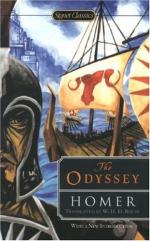He counted his goodly coppers and cauldrons, his gold and all his clothes, but there was nothing missing; still he kept grieving about not being in his own country, and wandered up and down by the shore of the sounding sea bewailing his hard fate. Then Minerva came up to him disguised as a young shepherd of delicate and princely mien, with a good cloak folded double about her shoulders; she had sandals on her comely feet and held a javelin in her hand. Ulysses was glad when he saw her, and went straight up to her.
“My friend,” said he, “you are the first person whom I have met with in this country; I salute you, therefore, and beg you to be well disposed towards me. Protect these my goods, and myself too, for I embrace your knees and pray to you as though you were a god. Tell me, then, and tell me truly, what land and country is this? Who are its inhabitants? Am I on an island, or is this the sea board of some continent?”
Minerva answered, “Stranger, you must be very simple, or must have come from somewhere a long way off, not to know what country this is. It is a very celebrated place, and everybody knows it East and West. It is rugged and not a good driving country, but it is by no means a bad island for what there is of it. It grows any quantity of corn and also wine, for it is watered both by rain and dew; it breeds cattle also and goats; all kinds of timber grow here, and there are watering places where the water never runs dry; so, sir, the name of Ithaca is known even as far as Troy, which I understand to be a long way off from this Achaean country.”
Ulysses was glad at finding himself, as Minerva told him, in his own country, and he began to answer, but he did not speak the truth, and made up a lying story in the instinctive wiliness of his heart.
“I heard of Ithaca,” said he, “when I was in Crete beyond the seas, and now it seems I have reached it with all these treasures. I have left as much more behind me for my children, but am flying because I killed Orsilochus son of Idomeneus, the fleetest runner in Crete. I killed him because he wanted to rob me of the spoils I had got from Troy with so much trouble and danger both on the field of battle and by the waves of the weary sea; he said I had not served his father loyally at Troy as vassal, but had set myself up as an independent ruler, so I lay in wait for him with one of my followers by the road side, and speared him as he was coming into town from the country. It was a very dark night and nobody saw us; it was not known, therefore, that I had killed him, but as soon as I had done so I went to a ship and besought the owners, who were Phoenicians, to take me on board and set me in Pylos or in Elis where the Epeans rule, giving them as much spoil as satisfied them. They meant no guile, but the wind drove them off their course, and we sailed on till we came hither by night. It was all we could do to get inside the harbour, and none of us said a word about supper though we wanted it badly, but we all went on shore and lay down just as we were. I was very tired and fell asleep directly, so they took my goods out of the ship, and placed them beside me where I was lying upon the sand. Then they sailed away to Sidonia, and I was left here in great distress of mind.”




